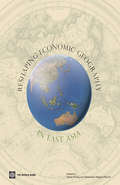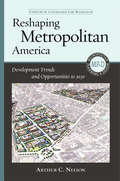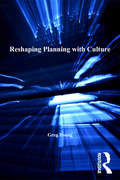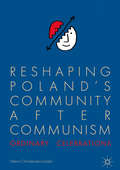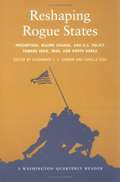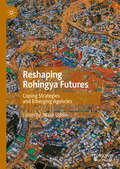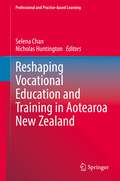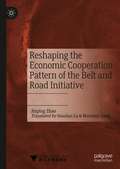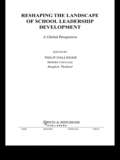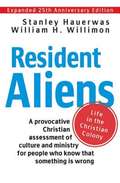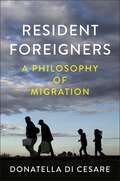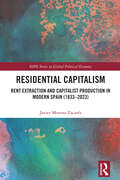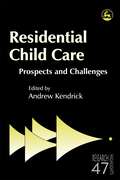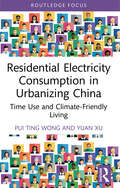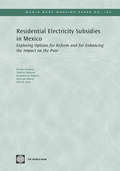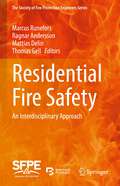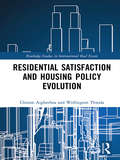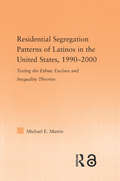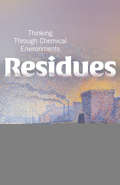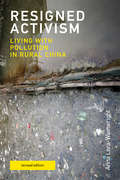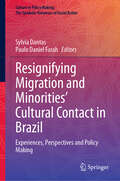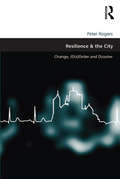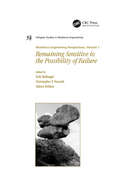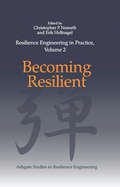- Table View
- List View
Reshaping Economic Geography in East Asia
by Yukon Huang Alessandro Magnoli BocchiThis companion volume to the 'World Development Report 2009' comprises twenty papers authored by noted Asian scholars. These studies highlight how, throughout East Asia, spatial considerations have influenced Government policies at the national, regional, and local levels. Key themes include how countries have dealt with: (1) agglomeration economies, urbanization, and regional disparities; (2) improving connectivity with infrastructure investments; and (3) eliminating barriers across and within countries to favor the movement of labor, goods and services. Achievements vary widely across countries: while some succeeded in enhancing competitiveness and improving social outcomes, others are experiencing increasing inequalities and failures to spur growth in disadvantaged areas. The book highlights many examples of how the new economic geography is reshaping development objectives: from initiatives to foster growth via enhanced agglomeration and improved local connectivity to the world economy, to special decentralization programs that channel resources to lagging regions. This volume will be of great interest to readers working in the areas of economic policy, poverty reduction and urban-rural development strategies, and transport-led infrastructure policy.
Reshaping Metropolitan America
by Arhur C. NelsonNearly half the buildings that will be standing in 2030 do not exist today. That means we have a tremendous opportunity to reinvent our urban areas, making them more sustainable and livable for future generations. But for this vision to become reality, the planning community needs reliable data about emerging development trends. Arthur C. Nelson delivers that resource in Reshaping Metropolitan America, providing statistics about changes in population, jobs, housing, nonresidential space, and other key factors. Most importantly, he shows the benefits of reshaping America in ways that meet emerging market demands, and then outlines a policy agenda to do so. Reshaping Metropolitan America does not simply make predictions; it shows that Americans want better communities, what the benefits are, and how to get there.
Reshaping Metropolitan America: Development Trends and Opportunities to 2030
by Arthur C. Nelson Earl BlumenauerNearly half the buildings that will be standing in 2030 do not exist today. That means we have a tremendous opportunity to reinvent our urban areas, making them more sustainable and livable for future generations. But for this vision to become reality, the planning community needs reliable data about emerging trends and smart projections about how they will play out. Arthur C. Nelson delivers that resource in Reshaping Metropolitan America. This unprecedented reference provides statistics about changes in population, jobs, housing, nonresidential space, and other key factors that are shaping the built environment, but its value goes beyond facts and figures. Nelson expertly analyzes contemporary development trends and identifies shifts that will affect metropolitan areas in the coming years. He shows how redevelopment can meet new and emerging market demands by creating more compact, walkable, and enjoyable communities. Most importantly, Nelson outlines a policy agenda for reshaping America that meets the new market demand for sustainable places.
Reshaping Planning with Culture
by Greg YoungPlanning is described as being increasingly sidelined by the impacts of neo-liberal restructuring. At the same time, 'culture' is nowadays seen as the world's key intellectual resource possessing new creative weight in sociological, economic and environmental terms. This book argues that, in the light of this cultural turn, there is the opportunity to re-position planning and proposes an original, practical and robust system of 'culturisation'. Culturisation is defined as the ethical, critical and reflexive integration of culture into planning and potentially other areas such as public administration, corporate strategy and development thinking. Cultural theory, planning theory, global governance policy and recent, innovative culturised practices are all explored to this end. The new theoretical and practical approach put forward shows how deeper, richer and more relevant ideas about culture can be utilized in planning, and is illustrated with international examples and two major case studies detailing new vistas for a refurbished planning.
Reshaping Poland’s Community after Communism: Ordinary Celebrations
by Helena Chmielewska-SzlajferHarnessing a cultural sociological approach to explore transformations in key social spheres in post-1989 Poland, Chmielewska-Szlajfer illuminates shifts in religiosity, sympathy towards others, and civic activity in post-Communist Poland in the light of Western influence over elements of Polish life.Reshaping Poland’s Community after Communism focuses on three major cases, largely ignored in Polish scholarship: (1) a hugely popular, faux-baroque Catholic shrine, which illustrates new strategies adopted by the Polish Catholic Church to attract believers; (2) Woodstock Station, a widely known free charity music festival, demonstrating new practices of sympathy towards strangers; and (3) the emergence of national internet pro-voting campaigns and small-town watchdog websites, which uncover changes in practical uses of civic engagement. In exploring grass-roots, everyday negotiations of religiosity, charity, and civic engagement in contemporary Poland, Chmielewska-Szlajfer demonstrates how a country’s cultural changes can suggest wider, dramatic democratic transformation.
Reshaping Rogue States: Preemption, Regime Change, and U.S. Policy Toward Iran, Iraq, and North Korea
by Alexander T. J. Lennon Camille EissIn January 2002, President George W. Bush declared Iran, Iraq, and North Korea constituents of an "axis of evil."
Reshaping Rohingya Futures: Coping Strategies and Emerging Agencies
by Nasir UddinThis edited book presents many hitherto unaddressed aspects of post-genocide Rohingya lives in refugee camps in Bangladesh. Amid an everyday struggle for daily essentials, violent tensions within and outside the camps, growing anti-Rohingya sentiment in the host community as well as the decreasing international support during the repatriation process, Rohingya adolescents and youths show strategies of coping and agency to alter their present and reshape their future. An upsurge in digital literacy, mounting transnational connectivity, growing engagement with diaspora Rohingya activism and a cumulative presence in social media for sentiment mobilisation on a local and global scale has motivated them to bring about change for themselves and their community within the camps. This book accommodates such fresh and high-quality research on the Rohingya refugees living in the borderland of Bangladesh and Myanmar, conducted by acclaimed academics, professional researchers, and committed activists from across the world, for researchers and students of migration, sociology of race and ethnicity, anthropology, diaspora studies, peace and conflict studies and social work.
Reshaping Vocational Education and Training in Aotearoa New Zealand (Professional and Practice-based Learning #34)
by Selena Chan Nicholas HuntingtonThis book contributes extensively to a better understanding of how vocational education and training (VET) and practice-based learning and teaching is developed and designed. It presents examples of vocational education as an ongoing dialogue, continually refreshed through engagement between educators and learners, Māori, employers, industry, and others. It demonstrates how the needs of learners can be met through relevant models of delivery, and how organisations and individuals work towards equity of access and parity of outcomes for all.It details the origins, purposes and evolution of vocational organisations, initiatives supporting Māori and Pasifika success and women in traditionally male-dominated occupations, the roles, provisioning and impact of foundation VET across different contexts, innovations through Certificate, Diploma and Degree programmes of learning, the contribution of new technologies to learning approaches, and the efficacy of education and professional development for VET teachers.This collection of chapters illustrates how Aotearoa New Zealand’s VET system is responding to challenging and changing environments through new frameworks of practice, approaches, and models of delivery. As an overview of a system in change, it is of interest to VET educators, system managers, and policy makers.
Reshaping the Economic Cooperation Pattern of the Belt and Road Initiative
by Jinping ZhaoThis book focuses on the important theme of economic cooperation along the Belt and Road. Starting from an analysis of current situation, the book defines the cooperation direction and specific tasks for extensive fields and goes on to provide a systematic analysis of the cooperation mechanism, trade, investment, infrastructure construction, energy and industry park cooperation along the Belt and Road. Using in-depth research on the situation, opportunities and challenges in pushing forward the economic cooperation along the Belt and Road, the author puts forward policy suggestions on the way forward.
Reshaping the Landscape of School Leadership Development: A Global Perspective (Contexts Of Learning Ser.)
by Philip HallingerReshaping the Landscape of School Leadership Development: A Global Perspective traces developments in this arena as they evolved since 1980. The book is comprised of chapters authored by the leading scholars in the fields of educational leadership and school leadership development from the United States, Canada, Europe, Asia, and Australia. The vol
Resident Aliens: Life in the Christian Colony (Expanded 25th Anniversary Edition)
by William H. Willimon Stanley HauerwasOnly when the Church enacts its scandalous Jesus-centered tradition, will it truly be the Body of Christ and transform the world. Twenty-five years after its first publishing, Resident Aliens remains a prophetic vision of how the Church can regain its vitality, battle its malaise, reclaim its capacity to nourish souls, and stand firmly against the illusions, pretensions, and eroding values of today's world.Resident Aliens discusses the nature of the church and its relationship to surrounding culture. It argues that churches should focus on developing Christian life and community rather than attempting to reform secular culture. Hauerwas and Willimon reject the idea that America is a Christian nation, instead Christians should see themselves as "residents aliens" in a foreign land. Stanley Hauerwas and William H. Willimon maintain that, instead of attempting to transform government, the role of Christians is to live lives which model the love of Christ. Rather than trying to convince others to change their ethics, Christians should model a new set of ethics which are grounded in the life, death, and resurrection of Christ.
Resident Foreigners: A Philosophy of Migration
by Donatella Di CesareFrom the shores of Europe to the Mexican-US border, mass migration is one of the most pressing issues we face today. Yet at the same time, calls to defend national sovereignty are becoming ever more vitriolic, with those fleeing war, persecution, and famine vilified as a threat to our security as well as our social and economic order. In this book, written amidst the dark resurgence of appeals to defend ‘blood and soil’, Donatella Di Cesare challenges the idea of the exclusionary state, arguing that migration is a fundamental human right. She develops an original philosophy of migration that places the migrants themselves, rather than states and their borders, at the centre. Through an analysis of three historic cities, Athens, Rome and Jerusalem, Di Cesare shows how we should conceive of migrants not as an other but rather as resident foreigners. This means recognising that citizenship cannot be based on any supposed connection to the land or an exclusive claim to ownership that would deny the rights of those who arrive as migrants. Instead, citizenship must be disconnected from the possession of territory altogether and founded on the principle of cohabitation – and on the ultimate reality that we are all temporary guests and tenants of the earth. Di Cesare’s argument for a new ethics of hospitality will be of great interest to all those concerned with the challenges posed by migration and with the increasingly hostile attitudes towards migrants, as well as students and scholars of philosophy and political theory.
Residential Capitalism: Rent Extraction and Capitalist Production in Modern Spain (1833–2023) (ISSN)
by Javier Moreno ZacarésOver the last decade, Spain has become an emblem of the contradictory relationship between capitalism and housing. During the house-price boom of the 2000s, Spain built homes on an unprecedented scale, with output levels that overshadowed those of every major European economy. Nevertheless, when the fortunes of real estate markets turned, a wave of repossessions ensued, and a massive number of households were thrown out into the street as a sizeable portion of the housing stock was lying vacant. In turn, the implosion of Spanish residential capitalism triggered an intense wave of unrest that has come to shape a decade of political turmoil.This book uses the Spanish case to bring to light, and theorise, the workings of residential capitalism. The author traces the evolution of residential provision from the nineteenth century to the present, situating the transformation of the housing market in a context of ongoing social change and conflict. The book shows how the present needs to be understood by looking at the historical process through which residential provision became subsumed under the logic of capitalist accumulation but also at a long genealogy of struggles around urbanisation and housing, the outcomes of which remain crystallised in Spain’s urban institutions. The author reveals how both residential capitalist development and urban social conflict have constituted each another, casting light on the historical relationship between housing crises, urban unrest, and the evolution of real estate markets. The book develops a historicist framework to understand residential capitalism, an important contribution for an age in which real estate markets have come to determine the rhythms of global capital.Addressing key issues and debates in the field, including the financialisation of housing, the politics of scale and urban entrepreneurialism, the political economy of the Eurozone, and the history of capitalist development, this book will be of great interest to students and scholars of political economy, as well as those engaged in crossover fields such as housing studies, urban geography, or financial geography.
Residential Child Care: Prospects and Challenges
by Claire Cameron Christine Barter Brigid Daniel Jane Scott Harriet Ward Andrew Kendrick Ruth Emond Laura Steckley Malcolm Hill Jo Dixon Janet Boddy Lynne Hunter Kirsten Stalker Aileen Barclay Judy Furnivall Irene Stevens Joe Francis Roger Bullock Van Beinum Teresa O'NeillResidential Child Care draws on the latest research to offer guidance for developing best practice, policy and improved outcomes for children and young people. Contributors examine important aspects of residential care work, and address the concerns about the poor outcomes for young people leaving care and the role of residential child care as a positive choice within the range of care services. Key issues addressed include promoting well-being and development for young people; tackling potential discrimination in residential policy and practice; responding to areas of discord in residential child care; and underpinning themes relating to residential child care, such as staff development and support. This book will provide essential reading for policy makers, managers and practitioners in residential care and the social services, and students in the field.
Residential Electricity Consumption in Urbanizing China: Time Use and Climate-Friendly Living (Routledge Focus on Energy Studies)
by Yuan Xu Pui Ting WongThis book forges a link between residential CO2 emissions and time use, focussing on China as a key case study. To provide a better understanding of the energy implications of the lifestyle differences between urban and rural China, Pui Ting Wong and Yuan Xu utilise time-use methodology as an alternative way to explore the links between individual lifestyle and residential electricity consumption. They begin by examining how Chinese citizens divide their time between daily activities, highlighting patterns around indicators including age, gender, education, and economic status. They go on to quantify CO2 intensities of these time-use activities. Through this linkage, this book presents an alternative strategy for climate-friendly living, highlighting the ways in which urban planning can be deployed to help individuals adapt their time-use patterns for CO2 mitigation. Providing a novel contribution to the growing literature on residential electricity consumption, Residential Electricity Consumption in Urbanizing China will be of great interest to scholars of climate policy, energy studies, time use, and urban planning.
Residential Electricity Subsidies in Mexico
by Todd M. Johnson Kristin Komives John R. Scott Jonathan D. Halpern Jose Luis AburtoLarge and growing subsidies to residential consumers in Mexico have become a major policy concern. This report explains the growth of subsidies, the current distribution of subsidies across income classes, and uses utility and household survey data to simulate how alternative subsidy mechanisms could improve distributional and fiscal performance. The goal is to help inform discussion in Mexico about how to reduce subsidies and redirect them toward the poor. The findings also offer lessons for other countries that are planning tariff reforms in their electricity sectors.
Residential Fire Safety: An Interdisciplinary Approach (The Society of Fire Protection Engineers Series)
by Marcus Runefors Ragnar Andersson Mattias Delin Thomas GellThis book provides a comprehensive overview of deaths and injuries from residential fires as well as the most up to date information on evidence-based approaches to reduce this problem. The volume serves as a guide for professionals working in the field of fire prevention and as a textbook for instruction in universities and fire service schools. The authors’ interdisciplinary approach, where public health methodology is combined with fire protection engineering, medicine, and policy science, is quite distinctive outside of the technical literature devoted to larger scale fire events. Traditional textbooks on fire protection tend to describe the problem as purely technical, whereas in essence it is a problem of human vulnerability. In this book, readers will find lucid and rigorous descriptions of various risk groups and effective preventive measures that are effective, both in general and with respect to the different risk groups. They will also find work processes to facilitate risk reduction. Summarizing state-of-the-art knowledge and giving guidance for the future, both in terms of preventive efforts and ongoing research, Residential Fire Safety: An Interdisciplinary Approach, is ideal for students, educators, and practitioners of residential fire protection.
Residential Satisfaction and Housing Policy Evolution (Routledge Studies in International Real Estate)
by Clinton Aigbavboa Wellington ThwalaThis book explores residential satisfaction and housing policy trends in developing nations by using subsidised low-income housing examples in South Africa, Ghana and Nigeria as case studies. While there has been much documentation on the formation of residential satisfaction and the evolution of housing policy in developed nations, relatively little has been written about these topics in developing nations. This book provides readers with two major practical insights: The first is focused on the theoretical underpinning of residential satisfaction and the formation of residential satisfaction in subsidised low-income housing through the development of a conceptual framework, while the second is focused on housing policy evolution and its trends in South Africa. In this section of the book, comparative overviews of public housing in two West African countries are provided with an emphasis on the philosophical basis for its development in these countries. The central aim of the book is to provide readers with ideas on residential satisfaction formation and housing policy trends in South Africa.
Residential Segregation Patterns of Latinos in the United States, 1990-2000: Testing The Ethnic Enclave And Inequality Theories (Latino Communities: Emerging Voices - Political, Social, Cultural and Legal Issues)
by Michael E MartinHistorically, residential segregation of Latinos has generally been seen as a result of immigration and the process of self-segregation into ethnic enclaves. The only theoretical exception to ethnic enclave Latino segregation has been the structural inequality related to Latinos that have a high degree of African ancestry. This study of the 331 metropolitan area in the United States between 1990 and 2000 shows that Latinos are facing structural inequalities outside of the degree of African ancestry. The results of the author's research suggest that Latino segregation is due to the mobility of Latinos and structural barriers in wealth creation due to limited housing equity and limited occupational mobility. In addition, Latino suburbanization appears to be a segregation force rather than an integration force. This study also shows that Mexicans, Puerto Ricans and Cubans have different experiences with residential segregation. Residential segregation of Cubans does not appear to be a problem in the U.S. Puerto Ricans continue to be the most segregated Latino sub-group and inequality is a large factor in Puerto Rican segregation. A more in-depth analysis reveals that the Puerto Rican experience is bifurcated between the older highly segregated enclaves where inequality is a large problem and new enclaves where inequality and segregation are not an issue. The Mexican residential segregation experience reflects that immigration and mobility are important factors but previous theorists have underestimated the barriers Mexicans face in obtaining generational wealth and moving from the ethnic enclave into the American mainstream.
Residues: Thinking Through Chemical Environments (Nature, Society, and Culture)
by Nathalie Jas Soraya Boudia Scott Frickel Carsten Reinhardt Angela N. Creager Emmanuel Henry Jody A. RobertsResidues offers readers a new approach for conceptualizing the environmental impacts of chemicals production, consumption, disposal, and regulation. Environmental protection regimes tend to be highly segmented according to place, media, substance, and effect; academic scholarship often reflects this same segmented approach. Yet, in chemical substances we encounter phenomena that are at once voluminous and miniscule, singular and ubiquitous, regulated yet unruly. Inspired by recent studies of materiality and infrastructures, we introduce “residual materialism” as a framework for attending to the socio-material properties of chemicals and their world-making powers. Tracking residues through time, space, and understanding helps us see how the past has been built into our present chemical environments and future-oriented regulatory systems, why contaminants seem to always evade control, and why the Anthropocene is as inextricably harnessed to the synthesis of carbon into new molecules as it is driven by carbon’s combustion.
Resigned Activism, revised edition: Living with Pollution in Rural China (Urban and Industrial Environments)
by Anna Lora-WainwrightAn examination of the daily grind of living with pollution in rural China and of the varying forms of activism that develop in response.Residents of rapidly industrializing rural areas in China live with pollution every day. Villagers drink obviously tainted water and breathe visibly dirty air, afflicted by a variety of ailments—from arthritis to nosebleeds—that they ascribe to the effects of industrial pollution. In Resigned Activism, Anna Lora-Wainwright explores the daily grind of living with pollution in rural China and the varying forms of activism that develop in response. This revised edition offers expanded acknowledgment of the contributions of Lora-Wainwright&’s collaborators in China.Lora-Wainwright finds that claims of health or environmental damage are politically sensitive, and that efforts to seek redress are frustrated by limited access to scientific evidence, growing socioeconomic inequalities, and complex local realities. Villagers, feeling powerless, often come to accept pollution as part of the environment; their activism is tempered by their resignation. Drawing on fieldwork done with teams of collaborators, Lora-Wainwright offers three case studies of &“resigned activism&” in rural China, examining the experiences of villagers who live with the effects of phosphorous mining and fertilizer production, lead and zinc mining, and electronic waste processing. The book also includes extended summaries of the in-depth research carried out by Ajiang Chen and his team in some of China&’s &“cancer villages,&” village-sized clusters of high cancer incidence. These cases make clear the staggering human costs of development and the deeply uneven distribution of costs and benefits that underlie China&’s economic power.
Resignifying Migration and Minorities' Cultural Contact in Brazil: Experiences, Perspectives and Policy Making (Culture in Policy Making: The Symbolic Universes of Social Action)
by Sylvia Dantas Paulo Daniel FarahThis volume provides in-depth discussions on the challenges of intercultural encounters in Brazil. It analyzes existing policies related to migration and minorities and proposes innovative approaches to policy-making. It also highlights policies that have had a real social impact. The volume consolidates theoretical contributions from authors of different but convergent fields to indicate the role of culture and cultural processes in a wide range of phenomena such as psychosocial intervention with immigrants, emigrants, returnees and refugees, homelessness, mental health and interculturality, mobility in urban settings, monolingualism and monocultural curriculum at Brazilian schools and universities, besides narratives of new and older immigrants. Displacement is one of the 21st century's greatest challenges, and this volume provides interdisciplinary perspectives on mobility and people in cultural contact in Brazil, the largest country in South America and the fifth most populous in the world. Although seen from a Brazilian scenario, issues discussed here permeate all other countries that are diverse and receive immigrants, and shed light on the complex socio-cultural world in which we live.
Resilience & the City: Change, (Dis)Order and Disaster (New Security Challenges Ser.)
by Peter RogersFollowing the turbulent events of the first few years of the 21st century, the growth of new security and disaster measures have led to significant changes to urban design and the management of urban space. This book blends the genealogical method of Foucault with the theory of rhythms by Lefebvre to examine these changes. The spatial history of urban disaster is linked to the rhythms of everyday urban experience to offer a revised understanding of the regulation of order and disorder in the city. In doing so, the book highlights issues of ’hardening’ space, the drift from civil defence to civil protection to civil contingencies and resilience; this assessment realigns the potential impact of tightening security practices and resilient ways of thinking, doing and acting on societal security. This also links to growing concerns about quality of life over the use and potential abuse of security and disaster legislation for managing social unrest. Examples studied include the increased exclusion of minorities (such as young people) from democracy and public life; security oriented interventions in the ethnic minority communities, the use of automated technologies in policing civil and minor offences (e.g. digital plate recognition and speeding) and the interplay of diverse social groups in more commercially aligned and increasingly ’securitised’ public spaces of the ’entrepreneurial’ city. This book highlights many significant problems with the direction of British democracy and suggests there may be both positive and negative results from becoming more resilient. While providing a critical appraisal of the realignment of neoliberal democracy at large, it also links discussion on ’gentrification’, ’revanchism’ and ’urban security’ to a forward looking agenda for further research.
Resilience Engineering Perspectives, Volume 1: Remaining Sensitive to the Possibility of Failure (Ashgate Studies in Resilience Engineering)
by Christopher P. NemethIn the resilience engineering approach to safety, failures and successes are seen as two different outcomes of the same underlying process, namely how people and organizations cope with complex, underspecified and therefore partly unpredictable work environments. Therefore safety can no longer be ensured by constraining performance and eliminating risks. Instead, it is necessary to actively manage how people and organizations adjust what they do to meet the current conditions of the workplace, by trading off efficiency and thoroughness and by making sacrificing decisions. The Ashgate Studies in Resilience Engineering series promulgates new methods, principles and experiences that can complement established safety management approaches, providing invaluable insights and guidance for practitioners and researchers alike in all safety-critical domains. While the Studies pertain to all complex systems they are of particular interest to high hazard sectors such as aviation, ground transportation, the military, energy production and distribution, and healthcare. Published periodically within this series will be edited volumes titled Resilience Engineering Perspectives. The first volume, Remaining Sensitive to the Possibility of Failure, presents a collection of 20 chapters from international experts. This collection deals with important issues such as measurements and models, the use of procedures to ensure safety, the relation between resilience and robustness, safety management, and the use of risk analysis. The final six chapters utilise the report from a serious medical accident to illustrate more concretely how resilience engineering can make a difference, both to the understanding of how accidents happen and to what an organisation can do to become more resilient.
Resilience Engineering in Practice, Volume 2: Becoming Resilient (Ashgate Studies in Resilience Engineering)
by Erik Hollnagel Christopher P. NemethThis is the fifth book published within the Ashgate Studies in Resilience Engineering series. The first volume introduced resilience engineering broadly. The second and third volumes established the research foundation for the real-world applications that then were described in the fourth volume: Resilience Engineering in Practice. The current volume continues this development by focusing on the role of resilience in the development of solutions. Since its inception, the development of resilience engineering as a concept and a field of practice has insisted on expanding the scope from a preoccupation with failure to include also the acceptable everyday functioning of a system or an organisation. The preoccupation with failures and adverse outcomes focuses on situations where something goes wrong and the tries to keep the number of such events and their (adverse) outcomes as low as possible. The aim of resilience engineering and of this volume is to describe how safety can change from being protective to become productive and increase the number of things that go right by improving the resilience of the system.
